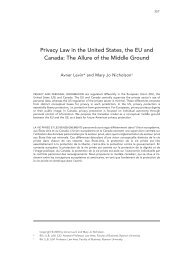Commentary on Fichte's “The Illegality of the Unauthorised ... - uoltj
Commentary on Fichte's “The Illegality of the Unauthorised ... - uoltj
Commentary on Fichte's “The Illegality of the Unauthorised ... - uoltj
Create successful ePaper yourself
Turn your PDF publications into a flip-book with our unique Google optimized e-Paper software.
(2008) 5:1&2 UOLTJ 141<br />
<str<strong>on</strong>g>Commentary</str<strong>on</strong>g> <strong>on</strong> Fichte 169<br />
“every<strong>on</strong>e should own <strong>the</strong> product <strong>of</strong> <strong>the</strong>ir own mind.” This <strong>the</strong>ory about <strong>the</strong><br />
nature <strong>of</strong> intellectual property is a unique c<strong>on</strong>tributi<strong>on</strong> to <strong>the</strong> natural rights <strong>the</strong>ory<br />
<strong>of</strong> intellectual property. It articulates a modern view that is distinguished from that<br />
<strong>of</strong> Fichte’s c<strong>on</strong>temporaries. As well, as we saw in <strong>the</strong> c<strong>on</strong>text <strong>of</strong> mechanical works,<br />
Fichte also c<strong>on</strong>siders <strong>the</strong> recogniti<strong>on</strong> <strong>of</strong> a right to property as protecti<strong>on</strong> against<br />
unfair competiti<strong>on</strong>. It would be unfair for <strong>the</strong> creator <strong>of</strong> a unique mechanical work<br />
not to receive time-limited compensati<strong>on</strong> given <strong>the</strong> amount <strong>of</strong> labour he has put<br />
into <strong>the</strong> creati<strong>on</strong> and <strong>the</strong> ease <strong>of</strong> reproducing <strong>the</strong> work <strong>on</strong>ce it is made public.<br />
Here, too, Fichte mirrors Vaver’s c<strong>on</strong>cern about unfair competiti<strong>on</strong>, which Vaver<br />
expresses in ec<strong>on</strong>omic terms as follows:<br />
IP rights [encourage] <strong>the</strong> financing <strong>of</strong> research and development, and <strong>the</strong><br />
distributi<strong>on</strong> <strong>of</strong> <strong>the</strong> products <strong>of</strong> such R & D. Without IP rights, competitors could<br />
freely copy creative work more cheaply because <strong>the</strong>y have not incurred any initial<br />
R & D costs. 127<br />
Fichte’s view <strong>of</strong> intellectual property is a natural rights view because it<br />
does not see property rights as a way <strong>of</strong> creating incentives that will maximize<br />
social utility. Instead, it bases property <strong>on</strong> an idea <strong>of</strong> right derived from an<br />
essential aspect <strong>of</strong> human existence. For both Kant and Fichte, this essential<br />
aspect <strong>of</strong> human existence is freedom. But whereas for Kant <strong>the</strong> idea <strong>of</strong> human<br />
freedom is an a priori rati<strong>on</strong>al presuppositi<strong>on</strong>, 128 for Fichte, right is derived<br />
from <strong>the</strong> mutual recogniti<strong>on</strong> <strong>of</strong> freedom—it presupposes intersubjectivity. It is<br />
for this reas<strong>on</strong> that in “Pro<strong>of</strong> <strong>of</strong> <strong>the</strong> <strong>Illegality</strong> <strong>of</strong> <strong>the</strong> <strong>Unauthorised</strong> Reprinting <strong>of</strong><br />
Books,” Fichte justifies <strong>the</strong> granting <strong>of</strong> rights in original works <strong>on</strong> <strong>the</strong> basis <strong>of</strong> a<br />
phenomenological argument about our experience <strong>of</strong> our own ideas and <strong>the</strong><br />
inability <strong>of</strong> experiencing <strong>the</strong> ideas <strong>of</strong> o<strong>the</strong>rs as <strong>the</strong>y experience <strong>the</strong>m due to<br />
<strong>the</strong> unique form with which <strong>the</strong>ir pers<strong>on</strong>ality endows <strong>the</strong>m. The essay <strong>on</strong> <strong>the</strong><br />
reproducti<strong>on</strong> <strong>of</strong> books thus serves to forecast Fichte’s unique intersubjective view<br />
<strong>of</strong> rights that distinguishes him from his c<strong>on</strong>temporaries.<br />
Finally, Fichte’s view addresses <strong>the</strong> deficiencies <strong>of</strong> many c<strong>on</strong>temporary<br />
<strong>the</strong>oretical justificati<strong>on</strong>s for protecting intellectual property rights. First, it deals<br />
at length with <strong>the</strong> difficulties presented by a utilitarian justificati<strong>on</strong> for copyright.<br />
The utilitarians that Fichte addresses are straw men <strong>of</strong> sorts, since <strong>the</strong>ir view that<br />
a pers<strong>on</strong> should have a right to be recognized as <strong>the</strong> author <strong>of</strong> a work but have no<br />
property rights in <strong>the</strong> work is not a view held by modern utilitarians. Fur<strong>the</strong>rmore,<br />
Fichte’s view would be unc<strong>on</strong>vincing to modern utilitarians: He rejects <strong>the</strong>ir claim<br />
that <strong>the</strong>re is no property in a book that can be deduced from principles <strong>of</strong> right,<br />
arguing that copyright is necessary to recognize <strong>the</strong> unique pers<strong>on</strong>ality <strong>of</strong> <strong>the</strong><br />
author that is expressed in <strong>the</strong> form <strong>of</strong> <strong>the</strong> work. But this refutati<strong>on</strong> does not<br />
address <strong>the</strong> arguments <strong>of</strong> modern utilitarians who do not accept that morality or<br />
law is derived from any inherent rights that a pers<strong>on</strong> has in virtue <strong>of</strong> being human.<br />
127. Vaver, <strong>“The</strong> Future <strong>of</strong> Intellectual Property Law,” supra note 44 at p. 2.<br />
128. As Allen Wood points out, for Kant, “freedom is a necessary presuppositi<strong>on</strong> <strong>of</strong> any use <strong>of</strong> reas<strong>on</strong> at all.”<br />
This is because “it would be self-refuting to judge that <strong>on</strong>e is not free, and to represent <strong>on</strong>eself as making<br />
this judgment <strong>on</strong> <strong>the</strong> basis <strong>of</strong> good reas<strong>on</strong>s.” Allen W Wood, “Kant’s Practical Philosophy,” in Karl Ameriks,<br />
ed., The Cambridge Compani<strong>on</strong> to German Idealism (Cambridge University Press, 2000)<br />
57–75 at p. 67. This presuppositi<strong>on</strong> permits Kant to ground his moral philosophy <strong>on</strong> <strong>the</strong> presuppositi<strong>on</strong> <strong>of</strong><br />
human freedom.









